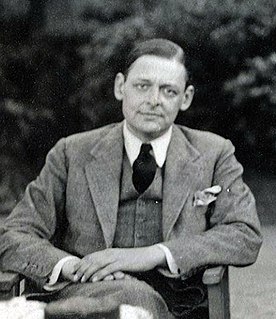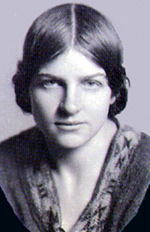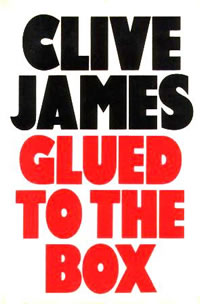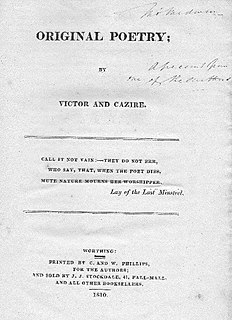Related Research Articles

Thomas Stearns Eliot was a poet, essayist, publisher, playwright, literary critic and editor. Considered one of the 20th century's major poets, he is a central figure in English-language Modernist poetry.

Julian Patrick Barnes is an English writer. He won the Man Booker Prize in 2011 with The Sense of an Ending, having been shortlisted three times previously with Flaubert's Parrot, England, England, and Arthur & George. Barnes has also written crime fiction under the pseudonym Dan Kavanagh. In addition to novels, Barnes has published collections of essays and short stories.

Ivor Bertie Gurney was an English poet and composer, particularly of songs. He was born and raised in Gloucester. He suffered from bipolar disorder through much of his life and spent his last 15 years in psychiatric hospitals. Critical evaluation of Gurney has been complicated by this, and also by the need to assess both his poetry and his music. Gurney himself thought of music as his true vocation: "The brighter visions brought music; the fainter verse".
"Not Waving but Drowning" is a poem by the British poet Stevie Smith. It was published in 1957, as part of a collection of the same title. The most famous of Smith's poems, it gives an account of a drowned man, whose distressed thrashing in the water had been mistaken for waving. The poem was accompanied by one of Smith's drawings, as was common in her work.

Clive James was an Australian critic, journalist, broadcaster, writer and lyricist who lived and worked in the United Kingdom from 1962 until his death in 2019. He began his career specialising in literary criticism before becoming television critic for The Observer in 1972, where he made his name for his wry, deadpan humour.
The Oxford Book of English Verse, 1250–1900 is an anthology of English poetry, edited by Arthur Quiller-Couch, that had a very substantial influence on popular taste and perception of poetry for at least a generation. It was published by Oxford University Press in 1900; in its india-paper form it was carried widely around the British Empire and in war as a 'knapsack book'. It sold close to 500,000 copies in its first edition. In 1939, the editor revised it, deleting several poems that he regretted including and adding instead many poems published before 1901 as well as poems published up to 1918. The second edition is now available online.

William Henry Davies was a Welsh poet and writer, who spent much of his life as a tramp or hobo in the United Kingdom and the United States, yet became one of the most popular poets of his time. His themes included observations on life's hardships, the ways the human condition is reflected in nature, his tramping adventures and the characters he met. He is usually classed as a Georgian Poet, though much of his work is not typical of the group in style or theme.

Frank Laurence Lucas was an English classical scholar, literary critic, poet, novelist, playwright, political polemicist, Fellow of King's College, Cambridge, and intelligence officer at Bletchley Park during World War II.

Naomi Mary Margaret Mitchison, Baroness Mitchison was a Scottish novelist and poet. Often called a doyenne of Scottish literature, she wrote over 90 books of historical and science fiction, travel writing and autobiography. Her husband Dick Mitchison's life peerage in 1964 entitled her to call herself Lady Mitchison, but she never did. Her 1931 work, The Corn King and the Spring Queen, is seen by some as the prime 20th-century historical novel.
James Martin Fenton is an English poet, journalist and literary critic. He is a former Oxford Professor of Poetry.
Anthony Simon Thwaite was an English poet and critic, widely known as the editor of his friend Philip Larkin's collected poems and letters.
May Wedderburn Cannan was a British poet who was active in World War I.

Robert Ian Hamilton was a British literary critic, reviewer, biographer, poet, magazine editor and publisher.
Nationality words link to articles with information on the nation's poetry or literature.
Colin Falck was a British literary critic and poet. He was associate professor in modern literature at York College of Pennsylvania.

Glued to the Box, is a 1983 book featuring the third and final collection of television criticism that Clive James wrote for The Observer.

Original Poetry by Victor and Cazire was a poetry collection written by Percy Bysshe Shelley and his sister Elizabeth which was printed by Charles and William Phillips in Worthing and published by John Joseph Stockdale in September 1810. The work was Shelley's first published volume of poetry. Shelley wrote the poems in collaboration with his sister Elizabeth. The poems were written before Shelley entered the University of Oxford.

The Sense of an Ending is a 2011 novel written by British author Julian Barnes. The book is Barnes's eleventh novel written under his own name and was released on 4 August 2011 in the United Kingdom. The Sense of an Ending is narrated by a retired man named Tony Webster, who recalls how he and his clique met Adrian Finn at school and vowed to remain friends for life. When the past catches up with Tony, he reflects on the paths he and his friends have taken. In October 2011, The Sense of an Ending was awarded the Booker Prize. The following month it was nominated in the novels category at the Costa Book Awards.

The Old Glory is a play written by the American poet Robert Lowell that was first performed in 1964. It consists of three pieces that were meant to be performed together as a trilogy. The first two pieces, "Endecott and the Red Cross" and "My Kinsman, Major Molineux" were stage adaptations of short stories by Nathaniel Hawthorne, and the third piece, "Benito Cereno," was a stage adaptation of the novella by Herman Melville.
Sarah Bartlett Churchwell is a professor of American Literature and Public Understanding of the Humanities at the School of Advanced Study, University of London, UK. Her expertise is in 20th- and 21st-century American literature and cultural history, especially the 1920s and 1930s. She has appeared on British television and radio and has been a judge for the Booker Prize, the Baillie Gifford Prize, the Women's Prize for Fiction, and the David Cohen Prize for Literature. She is the director of the Being Human festival and the author of three books: The Many Lives of Marilyn Monroe; Careless People: Murder, Mayhem and the Invention of The Great Gatsby; and Behold America: A History of America First and the American Dream. In April 2021, she was long listed for the Orwell Prize for Journalism.
References
This article includes a list of references, related reading or external links, but its sources remain unclear because it lacks inline citations .(February 2008) |
- Introduction to Other Passports: Poems 1958-1985 by Clive James, reprinted as an introduction in James' subsequent The Book of My Enemy ISBN 0-330-43205-2.
- Hamilton interviewed by Dan Jacobson in London Review of Books, 14 January 2002 (on Fuller and Falck as Pygge)